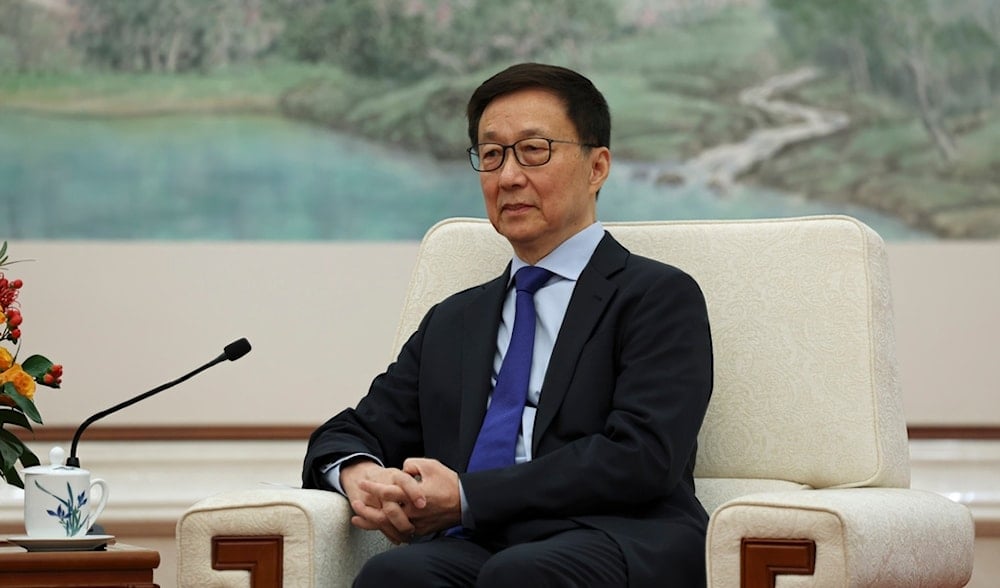China VP to attend Trump's inauguration in effort to improve ties: WSJ
China is taking a more cordial approach with the incoming Trump administration, a report by the Wall Street Journal states.
-

Chinese Vice President Han Zheng attend a meeting with Britain's Chancellor of the Exchequer Rachel Reeves at the Great Hall of the People in Beijing, Saturday, Jan. 11, 2025 (AP)
For the first time, China is sending a top-ranking Chinese Communist Party official to Donald Trump’s inauguration on Monday, reflecting Beijing's dual approach of engaging with the incoming US president while also signaling that it will respond swiftly and forcefully if relations deteriorate, a Wall Street Journal report stated.
Trump had invited Chinese leader Xi Jinping to his inauguration, but China’s Foreign Ministry announced that Vice President Han Zheng will attend as Xi’s special representative.
The ministry emphasized China’s willingness to cooperate with the incoming US administration to improve relations, saying "We stand ready to work with the new US government to enhance dialogue and communication … and find the right way for the two countries to get along with each other."
Although considered a "demotion" relative to President Xi, Wu Xinbo, an international relations scholar at Fudan University in Shanghai, said that sending the Chinese Vice President was Beijing's way to showcase its respect for Trump's invitation. It is worth noting that Japan and India, considered the US' key security partners in the east, are sending their foreign ministers.
The incoming Trump administration has repeatedly expressed a more hard-line approach toward China. Earlier this week, secretary of state nominee Marco Rubio claimed China was “the most potent and dangerous near-peer adversary this nation has ever confronted," emphasizing the government's will to counter Beijing once it assumes power.
However, China has also reciprocated certain economic measures taken by the US, namely when it comes to trade. Earlier in January, China announced punitive trade measures targeting several US companies, including Raytheon, Boeing, and Lockheed Martin, signaling a potential escalation in tensions between the two global powers, The New York Times reported.
The Ministry of Commerce in China confirmed that 28 companies have been added to its export control list, citing the need to “safeguard national security and interests.” This move includes banning the export of dual-use items—those with both civilian and military applications—to the affected companies.
Additionally, 10 firms have been placed on an “unreliable entities list” for their involvement in arms sales to Taiwan. These firms are now barred from conducting business in China, with their executives prohibited from entering or residing in the country.
Avoiding the 'Biden years'
Despite this, Beijing indicated a readiness to push for a swift agreement in order to prevent a worsening conflict over trade, according to The Wall Street Journal. China’s Foreign Ministry reacted favorably when Trump mentioned in a recent interview that his team had been in talks with representatives of Xi, whom he referred to as a "powerful" leader he could collaborate with.
According to the report, Beijing is partly motivated to ease trade tensions with the US due to concerns that escalating conflicts could undermine China’s fragile economic recovery. After implementing a major stimulus package to combat deflation, a prolonged property downturn, and weak consumption, China saw a 5% GDP growth in 2024, meeting its target thanks to strong exports and the stimulus.
Han, a member of China’s influential Politburo, holds the vice presidency with responsibilities in diplomacy and environmental policy. He often represents Xi at international events like UN climate negotiations.
Since beginning his third term in late 2022, Xi has increasingly delegated foreign travel to senior officials like Han and Premier Li Qiang. This shift has led to fewer high-level exchanges with the US, especially amid rising tensions over US export restrictions on Chinese tech and the Taiwan issue.
This time around, China appears to be shaking things up to avoid replicating the Biden years during trump's tenure, Shen Dingli, a retired international relations scholar in Shanghai, stated.
Over the past four years, the relationship "began low and ended high," with heated diplomatic confrontations over Taiwan and the Chinese balloon eventually leading to some cooperation on matters like reducing fentanyl production and addressing climate change.
"There is a good chance that there will not be such a turbulent start this time," Shen noted.

 4 Min Read
4 Min Read








